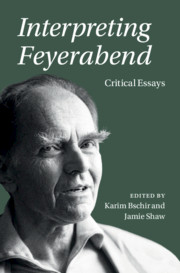Book contents
- Interpreting Feyerabend
- Interpreting Feyerabend
- Copyright page
- Contents
- Figures
- Tables
- Contributors
- Introduction
- Chapter 1 Feyerabend on Art and Science
- Chapter 2 The Coherence of Feyerabend’s Pluralist Realism
- Chapter 3 Feyerabend’s General Theory of Scientific Change
- Chapter 4 Feyerabend’s Theoretical Pluralism
- Chapter 5 Epistemological Anarchism Meets Epistemic Voluntarism
- Chapter 6 Feyerabend Never Was an Eliminative Materialist
- Chapter 7 Feyerabend’s Re-evaluation of Scientific Practice
- Chapter 8 On Feyerabend, General Relativity, and “Unreasonable” Universes
- Chapter 9 Feyerabend, Science and Scientism
- Chapter 10 Against Expertise
- Chapter 11 A Way Forward for Citizen Science
- Bibliography
- Index
Chapter 11 - A Way Forward for Citizen Science
Taking Advice from a Madman
Published online by Cambridge University Press: 26 March 2021
- Interpreting Feyerabend
- Interpreting Feyerabend
- Copyright page
- Contents
- Figures
- Tables
- Contributors
- Introduction
- Chapter 1 Feyerabend on Art and Science
- Chapter 2 The Coherence of Feyerabend’s Pluralist Realism
- Chapter 3 Feyerabend’s General Theory of Scientific Change
- Chapter 4 Feyerabend’s Theoretical Pluralism
- Chapter 5 Epistemological Anarchism Meets Epistemic Voluntarism
- Chapter 6 Feyerabend Never Was an Eliminative Materialist
- Chapter 7 Feyerabend’s Re-evaluation of Scientific Practice
- Chapter 8 On Feyerabend, General Relativity, and “Unreasonable” Universes
- Chapter 9 Feyerabend, Science and Scientism
- Chapter 10 Against Expertise
- Chapter 11 A Way Forward for Citizen Science
- Bibliography
- Index
Summary
Within science, there is a movement to utilise non-scientists for an array of scientific tasks. This movement, often called citizen science, has begun gaining popularity and momentum for the better part of the last decade (Dickinson and Bonney 2012; Miller-Rushing et al. 2012; Bonney et al. 2014). The term, ‘citizen scientist’, first appeared in the title of a sociology book in 1995, but was quickly taken up, first within Ornithology then quickly throughout the biological sciences (Busch 2013, p. 19). But before then, there has been a long tradition of amateur practitioners making amazing scientific discoveries.1 We need to only mention Darwin or Mendel to trigger others that have helped advance major areas of biology.2
- Type
- Chapter
- Information
- Interpreting FeyerabendCritical Essays, pp. 213 - 230Publisher: Cambridge University PressPrint publication year: 2021
- 5
- Cited by

